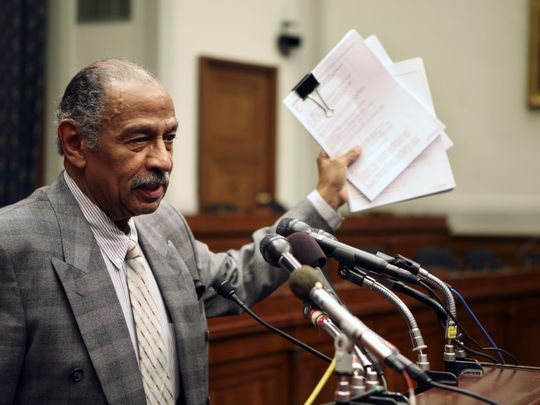
New York: Representative John Conyers junior, an advocate of liberal causes for five decades and the longest-serving African American in the history of Congress, has died. He was 90.
His death was confirmed by a family spokeswoman, Holly Baird.
Conyers, a Democrat, resigned in 2017 after accusations of unwelcome sexual advances by two women. His lawyers denied the accusations, but both Paul Ryan, a Republican and then the speaker of the House, and Nancy Pelosi, the House Democratic leader at the time and the current speaker, found the complaints credible and demanded that he step down.
Conyers was the only member of the House Judiciary Committee to participate in impeachment inquiries against both Presidents Richard M. Nixon and Bill Clinton.
In 1974, he said impeachment of Nixon was necessary “to restore to our government the proper balance of constitutional power and to serve notice on all future presidents that such abuse of power will never again be tolerated.”
But in 1998 he argued that Clinton’s relations with Monica Lewinsky did not merit impeachment. Republicans, he said, “say the president has to be impeached to uphold the rule of law, but we say the president can’t be impeached without denigrating the rule of law and devaluating the standard of impeachable offences.”
“This is not Watergate,” he added. “It is an extramarital affair.”
A sharp critic of the Iraq War and the broad antiterrorism law known as the USA Patriot Act, Conyers talked of impeaching President George W. Bush in 2005. But Pelosi, the House minority leader, discouraged the idea as a distraction from Democratic efforts to win control of the House, and he dropped it before becoming chairman of the House Judiciary Committee in 2007.
Conyers was always one of the most liberal members of the House. The liberal group Americans for Democratic Action rated his votes “liberal” 90 per cent of the time over his career.
First elected in 1964 — after winning the Democratic nomination by only 108 votes — Conyers was an early critic of the Vietnam War, voting against funding it the following May. He was one of only seven representatives, all Democrats, who did.
His outspoken stands and congressional efforts tell the history of liberal causes over the last half-century.
In the 1960s he worked with Senators Edward M. Kennedy and Howard H. Baker and defeated legislation to undo Supreme Court decisions requiring congressional districts in any state to have roughly equal populations.
In 1968, only days after the assassination of the Rev. Dr. Martin Luther King Jr., Conyers began a long and ultimately successful effort to make King’s birthday a national holiday, which was declared in 1983.
In the 1970s he began a long campaign for a government-run, single-payer system of national health insurance, and he proposed banning private ownership of handguns after assassination attempts against President Gerald R. Ford.
In the ‘80s, Conyers opposed the Reagan administration’s missile defence plans and its policy of “constructive engagement” with the apartheid regime in South Africa. He criticised the death penalty and began a series of hearings on police brutality that angered New York’s mayors, Ed Koch in 1983 and Rudy Giuliani in 1997. But he also worked to create and enlarge federal death benefits for police officers and firefighters who died in the line of duty.
In the 1990s, he opposed the Arabian Gulf War and pushed legislation to study the issue of reparations for slavery. He also challenged Janet Reno, the attorney general, over the government’s raid on the Branch Davidians religious sect at its compound in Waco, Texas, which ended with more than 70 people being killed.
Issues of race occupied, but did not preoccupy, Conyers. He was a founder of the Congressional Black Caucus in 1971. He opposed calls for “black power,” a movement that sought to create black institutions and make black people a political force, and instead emphasised the importance of registering and voting.
And he supported censure of the flamboyant black congressman Adam Clayton Powell junior in 1967 for misuse of congressional funds. The House voted to deny him his seat, overriding a recommendation from a special committee where Conyers served. In 1967, the Supreme Court ruled that his exclusion was unconstitutional.
Later that year The Washington Post said Conyers was “emerging as the leading Negro voice in Congress and as a growing figure in Negro America.” While there were five other black members of Congress at the time, The Post said, “only Conyers acts as though he has a constituency of 22 million Negroes.”
Conyers never rose beyond two House committee chairmanships, first of Government Operations in the 1980s and then of Judiciary. He ran twice for speaker of the House, in 1971 and 1973, losing overwhelmingly, and had two failed runs for mayor of Detroit, in 1989 and 1993.
John James Conyers junior was born in Detroit on May 16, 1929, a son of John and Lucille (Simpson) Conyers. His father was an executive of the United Auto Workers.
After high school, he worked as a spot welder in a Lincoln automobile plant and took night courses at Wayne State University. He enlisted in the Army in 1950, served in Korea as a second lieutenant and was discharged in 1954. He returned to Wayne State, earning a bachelor’s degree in 1957 and a law degree in 1958.
From 1958 to 1961 he worked as a legislative aide to Rep. John D. Dingell Jr., who in 2009 became the longest-serving member in the history of the House. He worked in state government and as a lawyer until running for Congress in 1964.
Information on survivors was not immediately available.
A longtime bachelor, Conyers, at the age of 61, married Monica Esters, a 25-year-old former staff member, in 1990.













